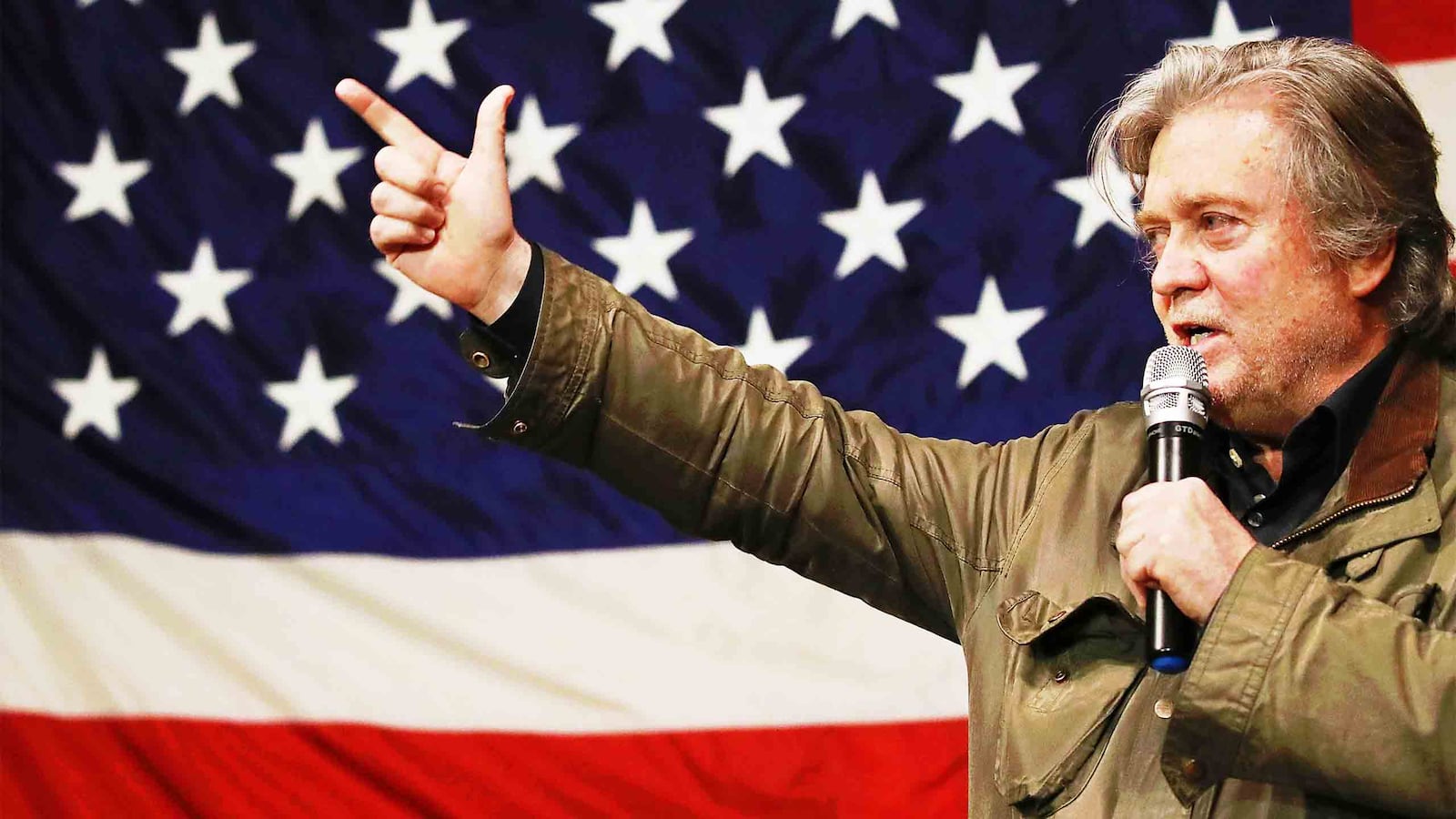It’s been announced that Steve Bannon will accompany Roy Moore in the final days of his campaign for the Alabama Senate seat.
Bannon believes Moore’s victory is important to his effort to transform the GOP into a populist-nationalist party and he plans to back other like-minded candidates against establishment Republican candidates in future primaries and elections. President Trump has backed Bannon’s strategy vis-à-vis Moore, to the extent that he said Moore denies the allegations made against him by numerous women, as if Moore’s denial proves the testimony against him false, finally even endorsing Moore via tweet Monday morning.
Bannon has extolled Moore as a prototype of the kind of populist and nationalist figure he wants to represent Americans in both houses of Congress. On Tuesday night, Bannon spoke alongside Moore at a rally in Southern Alabama. He made his fight against the GOP “establishment” quite clear by going full blast against Mitt Romney, chastising him for doing Mormon religious service rather than fighting in Vietnam. “You hid behind your religion,” Bannon said. “Do not talk to me about honor and integrity.” As Matt Lewis wrote on these pages, his words mark the “continuation of the degradation of the party of Lincoln and Reagan.”
His commitment to fight for Moore calls into question Bannon’s judgment and the definition of what he means by populist. Moore hardly mentions the economic issues that typically define populism and that Bannon once promoted, such as large infrastructure spending and fighting Wall Street to provide benefits for regular working people. Instead, Moore’s focus is on social issues like opposition to homosexuality and the separation of church and state.
So why does Bannon see Moore as an example of the type of candidate he wants to replace “establishment” Republicans with and as the kind of candidate he will support in future primary challenges against sitting GOP incumbents in the House in other states? Bannon’s views on this were made clear before Thanksgiving in a major presentation he gave at the annual “Restoration Weekend” sponsored by the David Horowitz Freedom Center and held at The Breakers in West Palm Beach, Florida.
In past years this annual event had included regular Republicans like Michael Steele and Karl Rove; even a few liberal Democrats were included to provide balance. For example, in 2006, one panel included myself (a person on the center/right), Matt Bai, then political reporter for The New York Times; and Marc Cooper, a journalist who was a contributing editor of The Nation magazine. At another one only a few years back, the columnist Bret Stephens spoke on foreign policy. But times have certainly changed and in recent years, moderates and centrists have been replaced by a Who’s Who of the Trumpist right, including people like Ann Coulter, Jeff Sessions, Phyllis Schlafly, Jesse Watters, Sebastian Gorka, Monica Crowley, Milo Yiannopoulos, Victor Davis Hanson, and of course, Steve Bannon.
Today, Horowitz explains that he views politics not as a mechanism of democracy in which different parties vie for the electorate’s support by advancing their own programs, and sometimes even accepting compromise as a path forward, but as the equivalent of war. In a war, the opposition is not a group of people with a different viewpoint who must be recognized as patriotic Americans, but as an enemy to be fought and defeated.
Horowitz’s group has given Bannon two awards. First, he was named by Horowitz as Man of the Year in December of 2016. Then, Horowitz called him an “unsung hero,” because “if [Trump] had not hired Steve Bannon as his chief executive officer, it is doubtful he would be president-elect.” Both he and Trump, Horowitz added, “were passionate patriots, distressed over America’s progressive decline, determined to restore the values and virtues that had made it a symbol of liberty and national greatness to the world at large.” And, he added, they both “had the courage to stand firm after fire.”
Bannon’s second award was the annual Annie Taylor Award for Political Courage, presented right before Thanksgiving of this year at the Center’s “Restoration Weekend.” The award was named after the woman who was the first person to go over Niagara Falls in a barrel and survive. Calling Bannon’s war “a war for our country,” Horowitz said it was about “patriotism… and its enemies.”
In a talk he gave at the event, Bannon spelled out his beliefs. Agreeing with Horowitz that “this is a war,” he argued that “working-class Americans think that America’s in decline,” something that “the elites of this country will never admit to.” He said that “the progressive left, the opposition party media, and the Republican establishment” all are running a “nullification project.” In that manner, he tied together the press, the left, and the GOP leaders as one and the same—all enemies of the people. Later during comments, he added that “Hillary Clinton and the Republican elites are very comfortable managing that decline.” They will not be satisfied until “they remove President Trump from office or force him to resign.” That is why, he admonished, the people had to “fight every day,” or “lose the country.”
In Bannon’s eyes, disruption and destruction of existing institutions is what it’s all about. And this brings us back to his strong support of Roy Moore. For him, a Moore victory would mean a rejection of the elite GOP establishment. Moore’s lack of a moral compass and his record of assaults against young pre-teen and teenage girls is something easily put aside for the greater good. The once-Democratic pollster Pat Caddell then added that the real enemy is not the Democrats, but the “never-Trump Republicans.” Bannon ended his remarks by bringing up Judge Moore once again, saying that the elites “on the first allegations… run for the tall grass.” His message to them was simple: “To hell with you.”
In a tweet he posted on Nov. 10, David Horowitz wrote the following:
<p>In my view Moore is guilty as accused. But 1) it happened 30 years ago, & 2) he can’t be removed from the ballot, & 3) electing a Dem strengthens a party that defends these criminals: Obama, the Clintons, Holder, Lynch, Abedin, Cheryl Mills etc. & their crimes are far far worse.</p>
In a nutshell, his rationale exposes the moral collapse of the Bannon-Horowitz type of conservatives. Whatever Moore’s guilt, which Horowitz accepts, someone opposed by the “elites,” even a likely pedophile, is preferable to Democrats, whom he sees as “criminals” who have committed horrendous “crimes.” Speaking recently at a Moore rally, Bannon said “I look forward to standing with Judge Moore and all of the Alabama deplorables in the fight to elect him to the United States Senate and send shockwaves to the political and media elites.” Conservatives who once argued that character and morality count as much as anything now have decided to ignore it completely.
As for the candidate himself, Moore told a Baptist church congregation that lesbian, gay, and transgender people, joined by godless socialists, were the ones fighting him. They were all “liberals” who “don’t hold conservative values. They are the lesbian, gay, bisexual, transgender who want to change our culture. They are socialists who want to change our way of life and put man above God… They’re the Washington establishment.”
Putting Roy Moore on a pedestal as a fighting nationalist-populist exposes the moral collapse of these pro-Trump elements in the conservative world. But for Bannon, getting Moore elected will be a Pyrrhic victory. If Moore shows up in the Senate they will have to refer him to the Senate Ethics Committee, in which there is a balance of Democrats and Republicans. Given today’s sensitivities about sexual harassment, he probably won’t fare too well. Moore’s election, should he win, might hinder Bannon’s agenda in the short term. Yet he seems determined to go out and recruit five, 10, or 20 candidates as deeply problematic as Roy Moore. That would produce even more problems for the GOP and might even lead to its eventual collapse.






